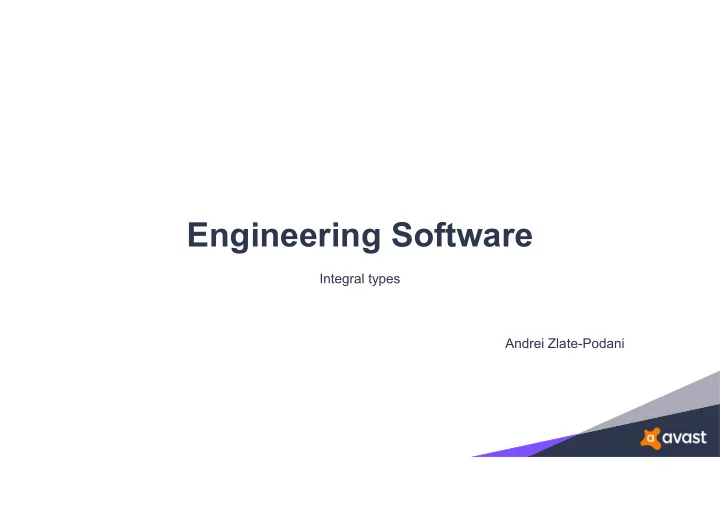

Engineering Software Integral types Andrei Zlate-Podani
1968 NATO Software Engineering Conference - Garmisch • Projects running over-budget • Projects running over-time • Software was inefficient • Software was of low quality • Software often did not meet requirements • Projects were unmanageable and code difficult to maintain • Software was never delivered 2
Writing software is bottom – up • Larger constructs are built by using basic operations and / or calling functions. • To preserve correctness it is necessary, but not sufficient, to satisfy the preconditions of the basic operations and functions. • Any errors need to be detected and reported to the next layer, unless they are dealt with locally. 3
Contracts 4
Contracts – find_if_not • No conversion from iterator’s value type to predicate’s parameter type. • Assume a range of float and a predicate that takes int • The values in the range must be independent of the adjoining ones • Assume a range over an UTF-8 string • The meaning associated with the values must be the same in the range and in the predicate. • Assume that the predicate is looking values in the metric system and the range uses imperial measures. 5
bool • false – true + true == false • false XOR true OR true == true 6
Characters • char distinct from signed char and unsigned char • wchar_t distinct type, sign and size are implementation defined • char16_t and char32_t are not fixed size • Numerical values who’s meaning is given by the encoding • The Unicode standard defines an N-to-1 relationship between code-points and glyphs 7
Å • U+00C5 (latin capital letter a with ring above) • U+212B (ångström symbol) • U+0041 U+030A ('A’ + combining ring above) 8
9
10
11
12
// Insert coded character, using UTF8 or 8-bit ASCII template<int Flags> void insert_coded_character(Ch *&text, ulong code) { if (Flags & parse_no_utf8) { // Insert 8-bit ASCII character } else { // Insert UTF8 sequence 13
Broken 14
Properties for signed integers • Addition is associative – partially • Addition is commutative – partially for sequences • Multiplication is associative & commutative – yes • Multiplication is distributive – partially • Division is distributive ( (a + b) / c ) – no • Division is the inverse of multiplication – partially • Multiplication if the inverse of division – no 15
Integral promotions 16
boost::accumulators 17
User’s guide 18
Reference 19
20
What about overflow? 21
C++17 added GCD & LCM support 22
LCM • lcm(65537, 65539) = 262‘147 • Actually it’s 4'295'229'443 • or 0x1'0004'0003 • or 33 bits 23
24
Unsafe operations • <numeric> header transform_inclusive_scan reduce adjacent_difference • inner_product <valarray> header inclusive_scan T sum(); exclusive_scan operator *= transform_reduce operator /= partial_sum operator += transform_exclusive_scan operator -= 25
So how do you detect overflows? • The processor does it for you for free! • The standard provides imaxdiv_t imaxdiv(intmax_t number, intmax_t denom); • But no add, subtract, multiply nor other division functions • We can use compiler extensions, write our own assembly routines or simulate the operations in code 26
Addition and subtraction 27
Multiplication 28
Multiplication 29
Division 30
31
32
33
Let’s fix accumulate 34
Haskell 35
Concluding remarks • The standard library could help us by providing add, sub, mul and div variants • Abstracting away essential details leads to incorrect code and APIs. (LSP for templates) • It is very easy to create unusable interfaces • The documentation is part of the API. If any pre-condition or behavior changes, the API itself has changed • We need libraries that provide reliable, safe and portable implementations and APIs 36
Questions Hacker’s Delight 2 nd Ed. by Henry S. Warren, Jr., ISBN 0-321-84268-5 • • The Art of Computer Programming: Seminumerical Algorithms by Donald Knuth • Burnikel C., Ziegler J., “Fast Recursive Division”, MPI-I-98-1-022 • Hansen, Per Brinch, "Multiple-Length Division Revisited: A Tour of the Minefield" • https://www.haskell.org/onlinereport/haskell2010/haskellch6.html#x13-1350006.4 azlatepodani@gmail.com 37
Is this a realistic precondition? 38
Bugs in the wild • CVE-2016-5223 Integer overflow in […] Google Chrome prior to 55.0.2883.75… • CVE-2017-14051 An integer overflow in […] the Linux kernel through 4.12.10… • CVE-2017-7529 Nginx versions […] are vulnerable to integer overflow… • CVE-2017-3738 There is an overflow bug in the AVX2 Montgomery multiplication procedure […] OpenSSL … 39
Recommend
More recommend